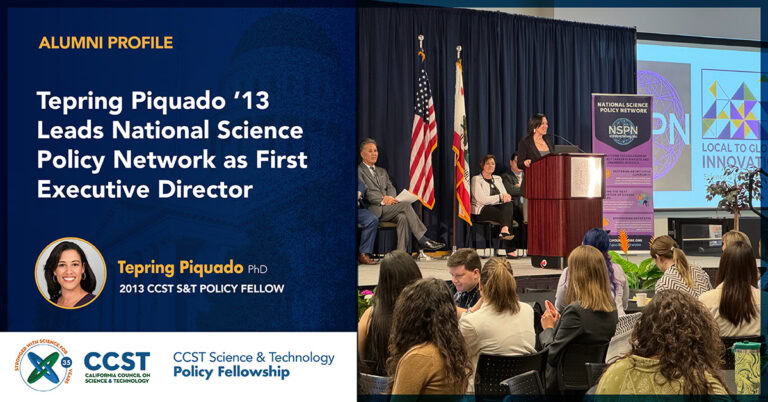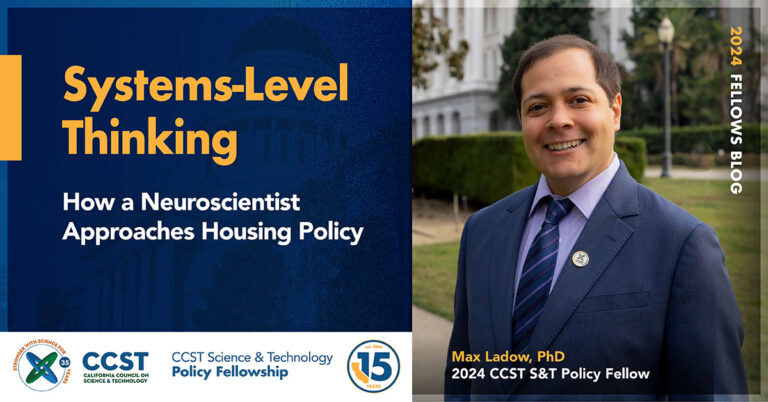CCST’s Brie Lindsey, PhD, Hired as Deputy Director at California Ocean Science Trust
CCST Annual Report 2021: Toward a Resilient California
March 31, 2022 | CCST Newsroom

We will remember 2021 as a year of crucial, often frustrating challenges. Science and technology helped us to cope. A historic rollout of COVID-19 vaccines and boosters protected many from severe symptoms and death.
Yet, growing numbers of Americans grew skeptical of guidance from medical science and weary of government mandates to protect public health. Wildfires raged in California and numerous global events foreshadowed the bill that future generations will pay for climate change.
The great scientific and educational institutions of California labored to chart better paths to resilience. However, it often proved hard for them to speak with a voice to government whose impact was more than simply the sum of our parts.
The issues where science and technology expertise can provide insight to the State are numerous. Our new five-year plan has introduced two important innovations for our work.
First, we decided to focus especially on building a more resilient and sustainable California, whether the problems be environmental or biomedical. Of course, we will respond to the broader gamut of issues brought to us by state policymakers.
However, we hope our special focus on resilience and sustainability will help to identify the interdependencies among the policy options for individual problems. Addressing specific issues in depth while embedding them in a broader context will help California better sort out priorities among many competing demands. This includes continuing attention to the dimensions of social and economic justice.
Second, we have fine-tuned how we provide advice. We now have a three-pronged approach. Our Science and Technology Policy Fellows contribute vital human capital for the legislature and executive branches to utilize scientific insights. Our full-scale investigations of problems defined by state leaders provide rigorously reviewed statements of the best research findings and a set of policy recommendations. These studies often require one to two years. As a result, we have created a suite of new methods for quicker responses.

CCST identifies outstanding experts incorporating the full range of needed understanding. Those experts then provide their individual insights and recommendations to policymakers. While less in-depth, this feedback is quick and builds valuable networks between the state’s researchers and government leaders.
Because of this strategy, in 2021, the state government decided to invest $5M to support our resilience work on climate change, wildfires, and pandemics. The analysis of our Disaster Resilience Initiative have already informed new federal and state policy that will improve accounting for the human health impacts of exposure to California wildfire smoke.
Our COVID-19 working group produced recommendations for legislators to strengthen preparation and response to future pandemics. And our Expert Briefings raised awareness of issues surrounding extreme heat, drought, electrical grid resilience, and more. We highlighted the economic and social impacts of research by partner institutions and created opportunities for their experts to participate in the policy arena. In 2022, we look forward to continuing to strengthen our partnerships to provide nonpartisan, evidence-based analyses and advice for California leadership. CCST looks forward to working with our extraordinary institutional and philanthropic partners to build a more resilient and sustainable future for all Californians.
— PETER COWHEY, PhD
Chair, CCST Board of Directors
Dean and Qualcomm Professor Emeritus,
UC San Diego School of Global Policy and Strategy
About the California Council on Science and Technology
The California Council on Science and Technology is a nonpartisan, nonprofit organization established via the California State Legislature — making California’s policies stronger with science since 1988. We engage leading experts in science and technology to advise State decision makers — ensuring that California policy is strengthened and informed by scientific knowledge, research, and innovation.






